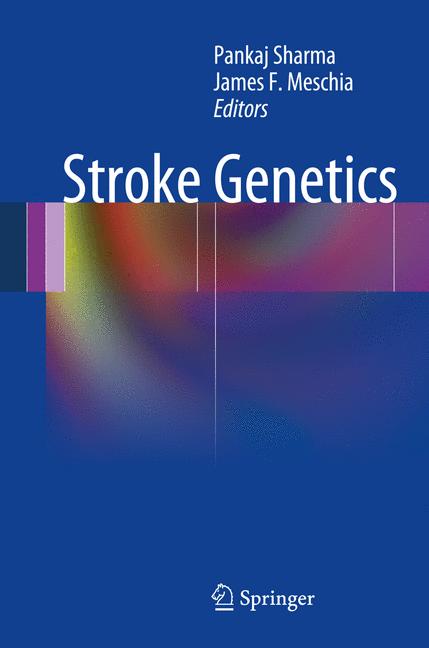(To see other currencies, click on price)
MORE ABOUT THIS BOOK
Main description:
Over the last decade there has been a substantial increase in our understanding of the genetic basis of common disorders such as stroke. Stroke Genetics is designed to give the reader an overall understanding of the genetics of complex diseases by using stroke as a paradigm. The reader will gain a comprehensive understanding of cerebrovascular genetics including the epidemiological evidence for the genetic basis of ischemic and hemorrhagic stroke, knowledge of its molecular basis from association, linkage and recent genome-wide studies, and also monogenic disorders. Finally, the legal and ethical complexities in dealing with these issues are discussed.
Stroke Genetics benefits from the contribution of renowned experts from throughout the world who have been intimately involved in unraveling the genetic etiology of stroke. Stroke Genetics is a valuable resource for neurologists, stroke physicians, hypertension specialists, internists, clinical pharmacologists and those in training, as well as researchers in the field of disease genetics.
Feature:
Summarizes the current state of knowledge in stroke genetics, using stroke as a paradigm in understanding other complex disorders thereby providing a single authoritative source on the molecular basis of stroke as well as for understanding the genetic basis of other common diseases
Brings together the leading experts from around the world
Tables and diagrams present information in a graphical form to assist the reader in quickly understanding key concepts
Contextualizes genetic technologies to assist the reader in understanding the implications of fast-developing new fields
Addresses in detail important monogenic causes of stroke
Back cover:
Over the last decade there has been a substantial increase in our understanding of the genetic basis of common disorders such as stroke. Stroke Genetics is designed to give the reader an overall understanding of the genetics of complex diseases by using stroke as a paradigm. The reader will gain a comprehensive understanding of cerebrovascular genetics including the epidemiological evidence for the genetic basis of ischemic and hemorrhagic stroke, knowledge of its molecular basis from association, linkage and recent genome-wide studies, and also monogenic disorders. Finally, the legal and ethical complexities in dealing with these issues are discussed.
Stroke Genetics benefits from the contribution of renowned experts from throughout the world who have been intimately involved in unraveling the genetic etiology of stroke. Stroke Genetics is a valuable resource for neurologists, stroke physicians, hypertension specialists, internists, clinical pharmacologists and those in training, as well as researchers in the field of disease genetics.
Contents:
Introduction.- Candidate Gene Association Studies in Stroke.- Genome-Wide Association Studies (GWAS).- The Genetics of Cerebral Aneurysms and Other Vascular Malformations.- Intracerebral Hemorrhage and Cerebral Amyloid Angiopathy.- Clinicogenetic and Pathologic Characteristics of CADASIL.- Monogenic Disorder: Fabry Disease.- Stroke-like Episodes in Mitochondrial Encephalopathy, Lactic Acidosis, and Stroke-like Episodes (MELAS).- Genetics of Sickle Cell Disease and Stroke.- Other Monogenetic Stroke Disorders.- White Matter Disease.- Genetics of Carotid Disease.- Genetics of Cervical Artery Dissection.- Stroke Pharmacogenetics.- Ethical Issues in the Genetics of Complex Disorders.
PRODUCT DETAILS
Publisher: Springer (Springer London)
Publication date: August, 2012
Pages: 340
Weight: 687g
Availability: Not available (reason unspecified)
Subcategories: Diseases and Disorders, Genetics, Neurology
Publisher recommends
CUSTOMER REVIEWS
From the reviews:
“This text reviews genetics of cerebrovascular diseases … . It covers the pathophysiology of occlusive small vessel disease and arteriopathies. It covers Fabry’s Disease, Amyloidosis, MELAS, etc., etc. It covers the imaging, pathophysiology, treatment, and complications for ischemia and hemorrhaging. I recommend this text for neurosurgeons, neurologists, physiologists, genetic investigators, and those with an interest in vascular diseases affecting the cerebrum.” (Joseph J. Grenier, Amazon.com, May, 2014)

